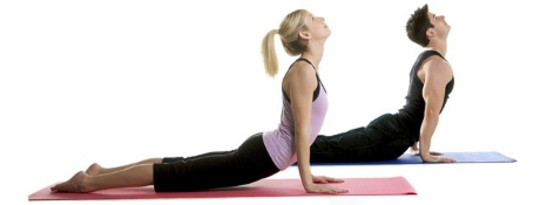
A recent survey suggests that yoga can be a substantial help for people with bipolar disorder, though the practice isn’t without risks.
“There is no scientific literature on hatha yoga for bipolar disorder,” says lead author Lisa Uebelacker, associate professor (research) of psychiatry and human behavior in the Alpert Medical School of Brown University and a staff psychologist at Butler Hospital.
Hatha yoga is the practice, familiar in the West, in which people move between various poses. It often includes breathing practices and meditation.
There is reason to think that there are ways in which it might be wonderful and ways in which it might not be safe. We are interested in studying hatha yoga for bipolar as an adjunctive treatment to pharmacotherapy.
Get The Latest By Email
The preponderance of responses from more than 70 people who answered the study’s online survey were that yoga has benefits for people with bipolar disorder.
When asked, “What impact do you think yoga has on your life?” the vast majority of responses were positive and about one in five respondents characterized yoga as “life changing.” One even said, “Yoga has saved my life. … I might not be alive today were it not for yoga.”
Twenty-nine other respondents said yoga decreased anxiety and promoted calm or provided other emotional benefits. Calm also emerged as a specific benefit for 23 survey respondents when asked how yoga affects mania symptoms.
Other benefits that were mentioned repeatedly included distraction from depressive thoughts and increased clarity of thought.
“There is clearly evidence that yoga seems to be a powerful practice for some individuals with BD,” the researchers write in the paper. “It was striking that some of our respondents clearly believed that yoga had a major positive impact on their lives.”
Heat And Breathing Risks
Throughout the survey there was also evidence that yoga could be problematic for some people with BD, although fewer people cited problems.
In response to survey questions about whether yoga has had a negative impact, for example, five respondents cited cases in which rapid or energetic breathing made them feel agitated. Another became too relaxed after a slow, meditative practice: “I fell into a relaxed state … near catatonic as my mind was depressed already. I was in bed for three days afterward.”
And like some people in general who practice yoga, 11 respondents warned that there is the potential for physical injury or pain. Another four said they became self-critical or frustrated with their performance sometimes during yoga.
“It’s possible that you want to avoid any extreme practice, such as extended periods of rapid breathing,” Uebelacker says.
The survey results also raise some concerns about heated yoga, which is consistent with evidence that the use of certain medications for bipolar disorder, including lithium and antipsychotic medications, are associated with possible heat intolerance and resulting symptoms of physical illness.
The results appear in the Journal of Psychiatric Practice.
Pilot Clinical Trial Coming Up
The online survey is the first stage in a research program that Uebelacker, who has spent several years studying yoga for unipolar depression, and colleague Lauren Weinstock, an expert in bipolar disorder, are developing to examine yoga for bipolar disorder.
They now have a grant from the Depressive and Bipolar Disorder Alternative Treatment Foundation to run a pilot clinical trial in which they will compare outcomes from yoga to outcomes from using a well-regarded workbook for bipolar disorder.
Those results could set the stage for a larger trial with enough statistical power to rigorously identify benefits and risks, Uebelacker says.
For many bipolar patients, symptoms persist for decades despite multiple medications. The current studies of yoga, Uebelacker says, are part of a broader program at Butler and Brown to determine what else can help people who are already undergoing conventional therapies.
“We’re looking at alternative ways to cope with suffering that is part of people’s everyday lives so that there are other options in addition to ongoing medication and psychotherapy” Uebelacker says.
As their research continues, they will learn what role hatha yoga might play.
Source: Brown University
Original Study
 About the Author
About the Author
David Orenstein is Science News Officer, at Medicine, Life Sciences and Public Health at Brown University. His Twitter account is @brownlifesci.
Recommended book:
Overcoming Trauma through Yoga: Reclaiming Your Body
by David Emerson and Elizabeth Hopper, PhD.
 The trauma-sensitive yoga described in this book moves beyond traditional talk therapies that focus on the mind, by bringing the body actively into the healing process. This allows trauma survivors to cultivate a more positive relationship to their body through gentle breath, mindfulness, and movement practices. Overcoming Trauma through Yoga is a book for survivors, clinicians, and yoga instructors who are interested in mind/body healing. It introduces trauma-sensitive yoga, a modified approach to yoga developed in collaboration between yoga teachers and clinicians at the Trauma Center at Justice Resource Institute, led by yoga teacher David Emerson, along with medical doctor Bessel van der Kolk.
The trauma-sensitive yoga described in this book moves beyond traditional talk therapies that focus on the mind, by bringing the body actively into the healing process. This allows trauma survivors to cultivate a more positive relationship to their body through gentle breath, mindfulness, and movement practices. Overcoming Trauma through Yoga is a book for survivors, clinicians, and yoga instructors who are interested in mind/body healing. It introduces trauma-sensitive yoga, a modified approach to yoga developed in collaboration between yoga teachers and clinicians at the Trauma Center at Justice Resource Institute, led by yoga teacher David Emerson, along with medical doctor Bessel van der Kolk.
Click here for more info and/or to order this book on Amazon.








